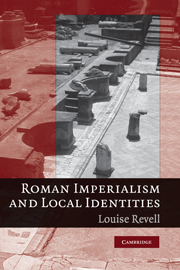6 - Being Roman
Published online by Cambridge University Press: 18 December 2009
Summary
The question of Roman-ness lies at the heart of this book: the ways in which meaning was created for the term in the past, and how any uniformity in meaning was constantly slipping, to create a multiplicity of possible meanings. Certain structures reproduced Roman power, Roman society and Roman culture, and these provided a common understanding of what it was to be Roman. Yet at the same time, they were the means through which any unified experience broke down, producing a paradox of similarity and diversity, both within individual communities and throughout the empire as a whole. The structures of Roman imperialism, such as religion or urbanism, were located within the everyday routines of the people of the provinces, and through these activities, they shared in an empirewide discourse of how a Roman life should be lived. They expressed this discourse through the material they used and the spaces they inhabited. This has a profound implication for our understanding of the power relations at play. Part of the authority of Rome rested on its superior military force and its ability to suppress discontent when it occurred in the forms of uprisings, such as the Jewish revolts of ad 66–70 and ad 132–5. However, whilst the significance of the threat of military might should not be downplayed, by the second century ad some areas, such as southern Iberia, had no permanent military garrisons. Military force was not the only means through which the imperial authorities held sway.
- Type
- Chapter
- Information
- Roman Imperialism and Local Identities , pp. 191 - 194Publisher: Cambridge University PressPrint publication year: 2008



